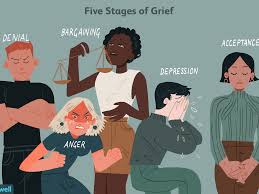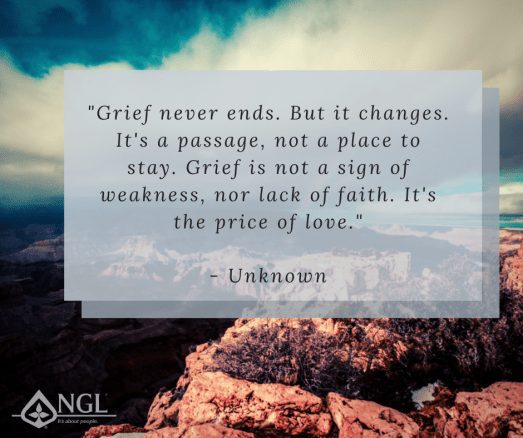Grief
Please watch this video and follow along with the content provided below:
Most people associate the word ‘grief’ with the sadness that surrounds the death of a loved one. Yet people can experience grief after many other losses, including a breakup, losing a job or a home, having a part of the body like an arm or leg removed, being diagnosed with a terminal illness, or having to drop out of college. All of these situations can lead to a feeling of loss and may add an extra layer of complexity that therapy could address.
Types Of Loss:
https://whatsyourgrief.com/types-of-grief/ for more information on the types we talk about in the video session

Grief is Hard–Take a moment, think about something you may be grieving.
Types of Grief:
- Complicated
- Anticipatory
- Delayed Grief
- Secondary Loss/Cumulative Grief
- Link to other types/further reading (https://whatsyourgrief.com/types-of-grief/)
Grief Emotions:
Grief is experienced in many ways. Emotions can range from anger to sadness or even numbness. Everything you feel is valid, and despite how intense your emotions maybe, you’re most likely progressing through the stages of grief: denial, anger, bargaining, depression, and acceptance; all explained below.
Express what you need to feel-hard emotions don’t mean “bad” (soda bottle example)
- Ways to feel in healthy ways (coping skills ideas/link to tools)
- Finding Support (Grief Share and Individual Counseling–church counseling center, BetterHelp, TalkSpace, OnSite for intensive work)
https://www.psychologytoday.com/us/therapists
Specific help for pregnancy loss or infant loss: https://mendwell.app/
Stages of Grief:

Understanding the stages of grief (i.e., denial, anger, bargaining, sadness, acceptance, meaning) can help us name, not numb, our feelings. The stages are neither perfectly linear nor orderly. You may experience the stages of grief in any order and any number of times. You may feel sad at the beginning, move on to anger, and then return to sadness. Take your time to grieve. Allow yourself to do it in your unique way.
-
- Denial, Anger, Bargaining, Depression, Acceptance
- Stages are not linear and can go back and forth
- “6th stage”-finding meaning-David Kessler
https://brenebrown.com/podcast/david-kessler-and-brene-on-grief-and-finding-meaning/
Denial:
is necessary to help you survive a loss. You’re in a state of shock because the world as you knew it no longer exists. You might start to deny the news of whatever loss you experienced. In this stage, you’re clinging to a “preferred” reality, instead of the true reality of the situation.
Anger:
might present itself in feelings of “why me” or “life isn’t fair”. It might present as blame toward others that the loss occurred or as a redirection of perceived slights. People of religious faith will often find they’re angry with God for letting this happen to them.
Bargaining:
is a form of false hope. It’s a form of “negotiation” with yourself or with a higher power that serves as a way to try to avoid the grief. It’s a willingness to make a major change in your life to bring things back to the way they used to be.
Depression:
is the phase where you accept that your attempts at avoidance and bargaining are futile. Reality begins to set in, and grief tends to enter your reality in a major way. The grief is often much deeper and persistent than you could have imagined and often feels like it’s never-ending. It could manifest in feelings of wanting to withdraw from life, feelings like nobody could possibly understand what you’re going through or help you feel better, and feelings of pure sadness.
Acceptance:
should not be confused with everything suddenly being “all right.” In fact, most people never again feel “all right” after a major loss. The acceptance stage is simply about coming to terms with the fact that your current loss is a permanent reality (the loved one who died will never come back, the terminal diagnosis will not go away, etc.). It’s not about learning to like the new reality. It’s about learning to live with this new norm. It’s about learning to readjust to life by taking on new roles or assigning them to others. It’s not about replacing the loved one, but instead about making new connections and relationships.
Finding Meaning:
is taking the next step in adjusting to your new reality. That may be celebrating your loved one’s life with love instead of just focusing on their death with pain, re-assessing your career path after losing a job, deciding what you do and do not want in a relationship after a break-up, etc.
Grief doesn’t go away, it just changes.
https://www.youtube.com/watch?v=khkJkR-ipfw

Verses for Encouragement
Psalm 73:26 “My flesh and my heart may fail, but God is the strength of my heart and my portion forever.”
John 14:27 “Peace I leave with you; my peace I give to you. Not as the world gives do I give to you. Let not your hearts be troubled, neither let them be afraid.”
Romans 15:13 “May the God of hope fill you with all joy and peace in believing, so that by the power of the Holy Spirit you may abound in hope.”
Psalm 34:18 “The Lord is near to the brokenhearted and saves the crushed in spirit.”
Worksheets for Grief Processing:
https://www.therapistaid.com/therapy-worksheets/grief/none


